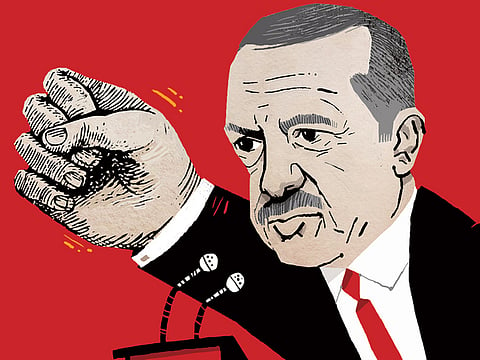Erdogan’s win helps tighten his iron grip
The president will get sweeping powers to reshape Turkey more than any leader since the founder of modern Turkey Mustafa Kamal Ataturk

Why is Turkey important? And does it really matter who is in charge in Ankara?
Apart from its strategically significant geopolitical location, Turkey has got the second largest army in Nato. Despite the end of the Cold War as the Soviet Union collapsed over two decades ago, Turkey’s significance has by no mean diminished. It is a vital Western ally bordering the currently world hottest spots, namely Syria and Iraq, and unquestionably has a key role in the Muslim world. With its nearly 82 million population, Turkey is also a continuous candidate for the European Union membership and is among the 20 largest economies of the world.
This is the first election in the country’s history where one of the presidential candidates, the charismatic 45-year-old former co-chairman of the Kurdish Peoples’ Democratic Party (HDP), Salahuddin Demirtas, is in jail. Arrested in November 2016, Demirtas has been running a campaign from his high prison in northwest Turkey of Edirne, controversially accused by Erdogan of terror-related charges for alleged links to outlawed Kurdish rebels. Demitras was able to run for office because he has not been convicted yet. He successfully managed to widen his political support circles to include non-Kurdish communities such as circular left-leaning and liberal voters.
However, if HDP reaches the 10 per cent threshold or over of votes, which seems to be the case, it will enter parliament. This might make it harder for Erdogan’s Justice and Development Party (AKP).
Belligerent Erdogan
Those who work close to Erdogan often complain of his belligerent mood, instantly ready to fight and argue. In power since 2003 first as prime minister (12 years) and as president since 2015, winning this year’s election will enhance his appetite for more power and his drive to becoming more authoritative. Before the results were officially out, Erdogan declared himself a winner in the first round with 53% of the votes, an increase of 2% on his votes in 2015 election.
This election’s results will grant Erdogan with sweeping power to reshape Turkey more than any leader since the founder of modern Turkey Mustafa Kamal Ataturk. From day one after the election a new constitution will be in play strengthening the president’s hand even further.
According to the new constitution the of prime minister will be eradicated and Erdogan will personally appoint or dismiss ministers, rule by decree when he finds it necessarily convenient and select judges.
Erdogan will run a presidency with no checks and balances, unlike any other presidential executive including that of France and the United States. In a speech last April, president Erdogan argued that an all-powerful presidency “is a guarantee that the political instability that used to plague Turkey will not return.”
For three decades between 1960s and 1990s, Turkey has seen its army drastically intervening in politics in four different occasions ostensibly claiming to be guarantor of Ataturk’s secular republic. AKP, rooted in conservative Islam, has successfully managed to curtail the military interference in political life. In August 2001 Erdogan founded AKP with his ally Turkey’s former president Abdullah Gul. Erdogan was voted to office as a prime minister after winning solid majority in parliamentary election in 2002-2003.
During his term in office as a president, Turkish courts jailed hundreds of officers for alleged coup attempts. The ranks have also been purged since the failed attempt to topple him in 2916. Soon after the failed attempt, he appeared on national television declaring himself as “chief commander.” Whether you like him or hate him, Erdogan gained such a wide popularity among ordinary Turks because his policy in the first ten years has brought Turkey economic growth and personal prosperity.
The average annual growth rate reached 4.5 per cent with Turkey becoming a powerhouse for manufacturing and export. By all accounts, the AKP government kept inflation under control. But this was soon to turn around as economy began declining as growth fell to 2.9 per cent and unemployment rose to 10 per cent. But remarkably he failed to avoid polarising the country as shown in the results of April 2017 constitutional referendum.
The Yes camp got 51.4%, not what Erdogan was hoping for. He heavily lost in the big urban cities such as Istanbul, Izmir and Ankara, as well as on the Mediterranean coast and in the Kurdish-majority areas in south-east Turkey.
Since his survival of the attempt on his life in 2016, Erdogan has become in the eyes of his supporters as the nation’s saviour with the task of the reinventing the “Umma of Islam.” Those who oppose him have become anti-Islam and anti-Turkey, i.e. enemy of the state.
The first comment Erdogan made after the election results was: “Turkey has given a lesson in democracy to the entire world.” Now, with the prospect of Erdogan potentially staying in power as head of state under the new system until 2029, the world will need to learn how to deal with a president deeply leading his country into autocracy.
Mustapha Karkouti is a columnist and former president of the Foreign Press Association, London. Twitter: @mustaphatache


